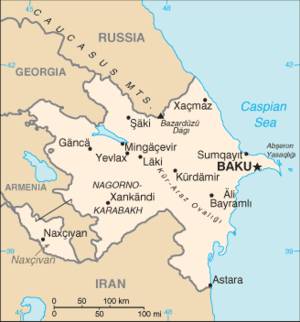Energy in Azerbaijan
Energy in Azerbaijan describes energy and electricity production, consumption and export in Azerbaijan.

Oil
- Production: - 931,990 bbl/d (148,175 m3/d) (2008)
- Consumption: - 160,000 bbl/d (25,000 m3/d) (2007)
At the turn of the 20th century, Azerbaijan accounted for half of the world’s oil production . Oil wells have been operating in Baku since the 1840s. As of the early 21st century, almost all production came from off shore in the Caspian Sea. Azerbaijan was one of only four former Soviet republics (along with Russian, Kazakhstan, and Turkmenistan) to be self-sufficient in petroleum. However, production declined following the 1991 breakup of the Soviet Union until foreign investment provided the capital for new development, turning this trend around in 1998. Production rose from 194,000 barrels per day (30,800 m3/d) in 1998 to an average of 318,000 barrels per day (50,600 m3/d) in 2004.
According to industry journals and government sources, proven oil reserves as of 2004 totaled between 7 billion and 13 billion barrels (2.1×109 m3). The State Oil Company of Azerbaijan (SOCAR) has planned for joint development of the off shore fields (which are now largely untapped) and has entered into several agreements to build oil pipelines. For instance, a project with the Caspian Pipeline Consortium would carry oil from the Caspian Sea to the Russian Black Sea port of Novorossiysk. Another deal with Turkey involved the construction of a 1,760 km pipeline, the symbolic first length of which was installed in September 2002, to carry crude oil from Baku to Ceyhan, Turkey. In 1995 Azerbaijan had 17 offshore oil fields in production. Guneshli, about 96 km off the Azeri coast, currently accounts for more than half the annual production. By the end of 2002, 33 companies in 15 foreign countries had signed agreements to develop 21 major oil fields in Azerbaijan. As of 2003 disputes over off shore oil rights in the Caspian Sea continued to hinder development of those reserves.
Transparency
The 2013 report by UK-based Global Witness NGO revealed that companies working in Azerbaijan’s oil industry have no transparency and accountability. It has been documented that millions of dollars of revenue disappear into the hands of obscurely owned private companies that cooperate with SOCAR.[1][2]
The report concluded that the opacity of the deals struck by Socar "is systemic" and added, “These findings should be of great concern to the international community as a whole. Oil and its derivative products are central to the Azerbaijani economy, making up 95% of exports in 2011. It is important for Europe that Azerbaijan keeps the oil and gas flowing and maintains a transparent and well-run energy industry. Yet this briefing shows that much of the oil business in Azerbaijan remains opaque, and corruption is still perceived to be at epidemic levels…"[2]
Natural Gas
Natural gas production has become more important in recent years, especially in Baku, where some of the oil wells have been exhausted. Proven reserves as of late 2004 totaled 1.37 trillion cubic metres. Production of natural gas in 2011 totaled 17.66 billion cubic metres. Ukraine and Iran are interested in running a natural gas pipeline through Azerbaijan en route to Eastern Europe.
On March 10, 2016, Natiq Aliyev, Azerbaijani energy minister, publicly said that Azerbaijan has enough gas reserves to fill the Southern Gas Corridor (SGC). The SGC is an energy project whose goal is to move 10 billion cub meters of gas from Azerbaijan through George and Turkey to Europe.[3]
Electricity
- production: 19.44 billion kWh (2011)
- consumption: 13.57 billion kWh (2011)
In 2011, net electricity generation was estimated at 19.44 billion kWh. In 2011, consumption of electricity was estimated at 13.57 billion kWh. Total installed capacity at the beginning of 2011 was 6.392 million kW. Eight thermal plants supply more than 80% of capacity, and the rest comes from 5 hydroelectric plants. The main power plants (both are thermal) were near Ali Bairamly (1,100 MW) and Mingechaur (2,100 MW).
Hydroelectric power plants
- Mingechevir Hydro Power Plant - 402 MW
- Sarsang Hydro Power Plant - 50 MW
- Shamkir Hydro Power Plant - 380 MW
- Yenikend Hydro Power Plant - 150 MW
Refineries
Petroleum and natural gas resources are the basis for an extensive system of refineries, which produce gasoline, herbicides, fertilizers, kerosene, synthetic rubber, and plastics.
Foreign investment competition with non-energy sectors
In January 2015, the president of Azerbaijan, Ilham Aliyev, announced that he would direct his government to create programs to bring investment dollars to industries other than oil. Specifically, President Aliyev cited industrial and agricultural industries as an example.[4]
Aliyev cited Azerbaijani’s economy by saying, “That’s why it’s much easier to attract investments to stable countries with socio-political stability and information growth.” He said that the banking industry will become more important in helping develop the country’s non-energy industries.[5]
See also
| Wikimedia Commons has media related to Category:Energy in Azerbaijan. |
References
- ↑ New Report Highlights Lack Of Transparency In Azerbaijan's Oil Industry. RFE/RL Dec. 10, 2013
- 1 2 Azerbaijan Anonymous Global Witness
- ↑ "News.Az - Minister: Azerbaijan's gas reserves enough to fill Southern Gas Corridor". news.az. Retrieved 2016-03-10.
- ↑ CISTran Finance Reports (16 January 2015). "Azerbaijan seeks foreign investment for non-oil sector". CISTran Finance. Retrieved 16 January 2015.
- ↑ "Azerbaijan Seeks to Attract Foreign Investors to its Non-Oil Sector". United States-Azerbaijan Chamber of Commerce. Retrieved 16 January 2015.

